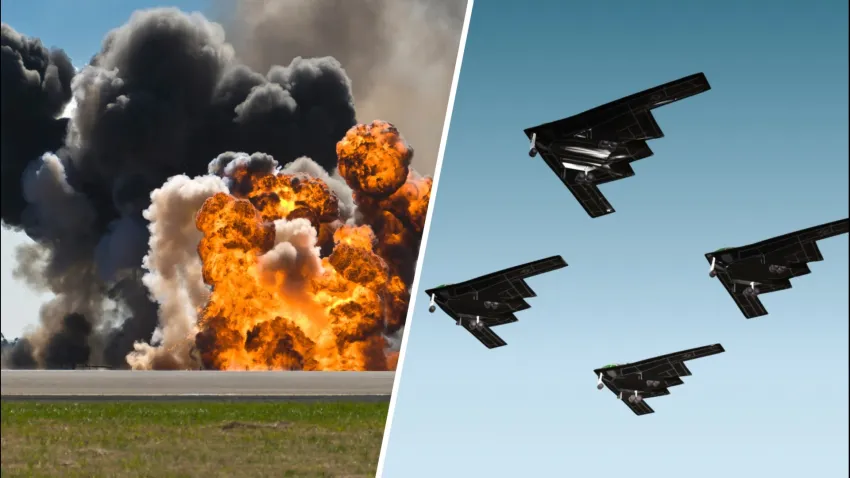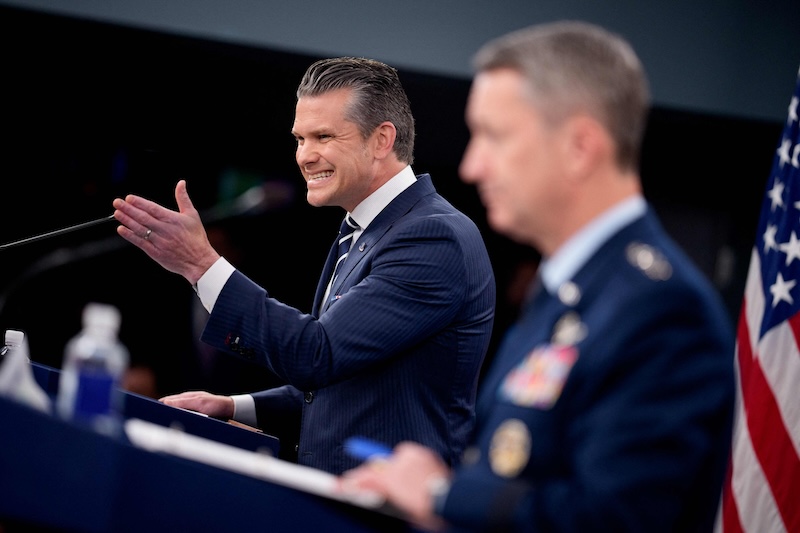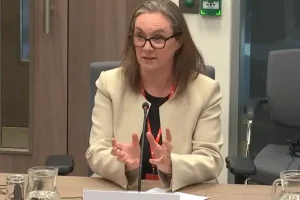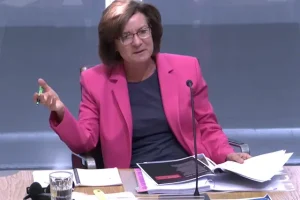Iran hits back as Strait of Hormuz closure looms and UK forces go on high alert
THE MIDDLE EAST stands on the brink of a wider war after the United States launched a massive overnight strike on three Iranian nuclear sites — triggering immediate retaliation from Tehran and warnings of further escalation.
Speaking from Chequers on Sunday, Prime Minister Sir Keir Starmer confirmed the UK had no involvement in the military action but was informed in advance. He said the government had moved assets to the region and was “taking all necessary steps” to protect British personnel and interests, adding: “The risk of escalation is real — across the Middle East and beyond.”
Operation Midnight Hammer

The US operation, codenamed Midnight Hammer, targeted nuclear enrichment facilities at Natanz, Isfahan and the deeply-buried site at Fordow. According to US Defence Secretary Pete Hegseth, the strike used B2 stealth bombers carrying 30,000lb “bunker-busting” bombs alongside submarine-launched Tomahawk missiles. A total of 125 US aircraft were involved.
General Dan Caine, Chair of the Joint Chiefs of Staff, said the strike was the largest B2 mission in history and met no resistance from Iranian air defences. “We believe we achieved destruction of key capabilities at Fordow,” Caine said. The site is thought to have been severely damaged, although Iran claims its nuclear know-how “cannot be destroyed.”
Hegseth hailed the operation as “an overwhelming success,” stating: “We devastated the Iranian nuclear programme. This was not about regime change. But it was a necessary response to an ongoing threat.”
Iran retaliates with missile strikes on Israeli cities
Hours later, Iran launched missile strikes on Israeli population centres in Tel Aviv and Haifa, with residential buildings damaged and emergency services responding to casualties. In Ramat Aviv, images showed residents surveying the damage and photographing shattered homes.
Iranian officials called the US “fully responsible” for the consequences of the escalation, and President Masoud Pezeshkian accused Washington of being the “main cause” behind Israel’s actions. Iran’s foreign minister called the strikes “outrageous” and warned of “everlasting consequences.”
Hormuz threat: Iran considers blocking oil route
In a dramatic move, Iran’s parliament has approved a plan to close the Strait of Hormuz, the narrow maritime passage through which around 20% of the world’s oil and gas supply flows. The final decision now lies with Iran’s Supreme National Security Council.
A senior Iranian commander warned: “This will be done whenever necessary.” UK Maritime Trade Operations has raised the threat level to commercial shipping in the Red Sea and Gulf of Aden to “high”.
US says door remains open to talks
Despite the strikes, US Vice President JD Vance told NBC that Washington still hopes to reach a diplomatic solution. “We do not want a protracted war,” Vance said. “We want to end their nuclear programme through a long-term settlement.”
Defence Secretary Hegseth echoed that sentiment, saying: “This is not open-ended. Iran was given every opportunity to come to the table. They chose not to. We still hope they do.”
UK response and political fallout
Sir Keir Starmer will chair an emergency COBRA meeting today. The UK has raised the alert level for its forces in the region and the Foreign Office has warned against all travel to Iran, Israel, and the Occupied Palestinian Territories.
Business Secretary Jonathan Reynolds said Iran remains a direct threat to the UK, stating: “No responsible British government could ever allow Iran to obtain nuclear weapons.” However, he stopped short of endorsing the strikes.
Conservative leader Kemi Badenoch praised the US response, calling it “decisive action against a regime that fuels global terror.” Lib Dem leader Ed Davey said de-escalation must now be the UK’s top priority.
Foreign Secretary David Lammy, who visited Washington last week, said there was still a “window of opportunity” to avoid wider conflict. He confirmed UK officials had engaged with Iranian representatives in a last-ditch diplomatic effort before the bombing.
UN warns of ‘dangerous escalation’
UN Secretary General António Guterres described the situation as “a dangerous escalation” and called on all sides to show restraint. The International Atomic Energy Agency confirmed no rise in radiation levels at the bombed sites, but warned Iran still holds enough enriched uranium to produce up to nine nuclear weapons.
The coming days may determine whether this crisis burns out or explodes further — with oil markets, shipping lanes, and global stability now all on the line.














